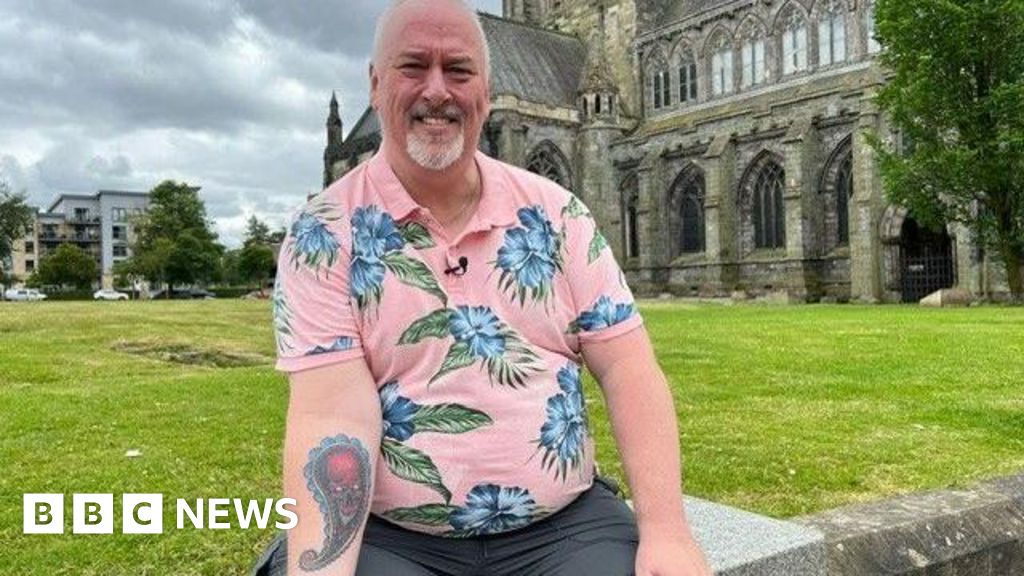World
A view from Paisley – the battle for the central belt – BBC News

- Author, David Wallace Lockhart and Catriona MacPhee
- Role, BBC Scotland News
- Reporting from Paisley
-
If you are looking for radical political tradition, you can do worse than head to Paisley, just 20 minutes from Glasgow.
In the 1820s, workers here organised to demand reform and threaten revolution.
But we do not have to go back 200 years to find political upheaval in Renfrewshire. Election night 2015 captured it perfectly.
A then unknown 20-year-old SNP candidate called Mhairi Black unseated one of Scotland’s most senior politicians – Labour’s Shadow Foreign Secretary Douglas Alexander.
The age of Scottish Labour domination in UK elections was over.
After an independence referendum that had reshaped Scottish politics, seats that had returned Labour MPs for decades – like the two constituencies that cut across Paisley – suddenly shifted allegiance.
As residents prepare to go to the polls again, many think that areas like this are suddenly back in play for Labour.
So what has happened? And what are Paisley “Buddies” (as residents here are affectionately known) thinking about as polling day approaches?
Few people know Paisley like local history guide David Roy.
As if his allegiance to his town was ever in doubt, he has recently had a Paisley pattern tattooed on his arm.
He explains that Paisley has always been “a heavy union town” with a background in textiles, manufacturing and engineering. Once upon a time that translated into vast support for Labour.
David believes that when unemployment “rocketed”, people moved towards the SNP.
So why do some believe Labour is back in contention at this election?
David points the finger at recent SNP scandals, saying these have caused some of the party’s support to collapse.
The tour guide is incredibly proud of his town, but acknowledges that changes are required. He warns that food bank use has increased and he laments the number of empty units on the high street.
But his optimism is infectious, and he insists that – with investment – Paisley’s best days are ahead of it.
At the West End Community Centre, elderly members of the Paisley community are coming together for their weekly lunch.
Over a bowl of lentil soup, Betty McCormick talks through her main concerns as the election gets closer. For her, a recent experience in the local A&E looms large.
She needed an ambulance, and it arrived within 10 minutes at around 20:00. But what followed was a long wait in a corridor before seeing a doctor – she did not get home until 05:30 the next morning.
Betty thinks there is a simple explanation for her experience: “There wasn’t the amount of doctors available to cope with who was there”.
Her lunch partner, Margaret Abraham, is doubtful that things will fundamentally change after the next elecie
She is fairly scathing about politicians of all parties: “The only time you ever see them is when there’s an election.”
Enjoying their post-soup cup of tea, as cakes are handed out, Jim Healy and Robert Stirling are happy to chat politics.
They share the cynicism of the ladies at the other end of the lunch hall.
Jim says he is “on the fence” about independence and has not seen much change in the time the SNP has led the Scottish government.
Robert is not sold on Sir Keir Starmer, questioning how a “true” Labour Party can be led by a man with a knighthood.
There are common topics that come up time and time again at this lunch club – the NHS, the cost of living and the state of the high street are recurring themes.
It is an elderly group who are certainly engaged in politics. But they are overwhelmingly sceptical that anything will change for them however they vote.
At the other end of town, and at the other end of the age spectrum, is 18-year-old Lucas Murray, from local band Frown.
He is out with his bandmates, proudly showing off a keyring he got at a recent Metallica gig in Copenhagen.
Denmark seems to have left an impression on him: “Everyone was really happy”, he reflects, as he glowingly describes the Scandinavian metro system.
Next week’s election will be the first one he is eligible to take part in, but he does not think there is much to inspire younger voters.
Politicians, he says, are “trying to appeal more to the people of their ages”. He does not think future job prospects or home ownership for his generation are being adequately addressed.
Realistically, the two Westminster seats that Paisley straddles will be fought between the SNP and Labour.
And these seats are not unlike dozens of others across the densely populated central belt of Scotland.
Both Labour and the SNP are trying to pitch themselves to locals – insisting they can address the concerns that Paisley buddies have about their town.
But it feels a bit like Paisley’s political radicalism has been replaced with a political cynicism of late, with many questioning what sort of difference this election is ultimately going to make.



